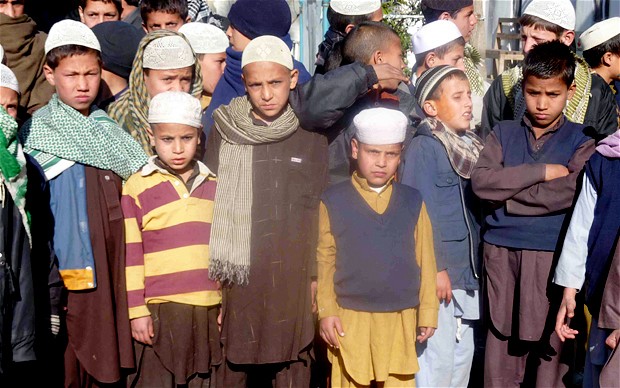By Shoaib Tanha Shukran & Hamed Kohistani
Teenagers are being recruited into the ranks of armed fighters against the government. The situation is particularly alarming in western Afghanistan – Herat, Farah, Ghor and Badghis provinces.
General Abdul Samad, chief of the National Directorate of Security in Farah, has evidence of recruitment of 15 to 18-year-old boys in Bala Bolok, Bakwah and Gulistan districts. Most of them have been sexually abused, and this has created internal problems for the Taleban, he claims.
The provincial head of AIHRC (Afghanistan Independent Human Rights Commission) in Ghor, Jawad Razayi, says children have been recruited to fight in Sharak, Dolaina, Charsada, Dawlatyar and Morghab area of Chaghcharan the capital. But Abdul Hai Khatibi the spokesperson of the Ghor governor, says the authorities have not received any such reports, and children were being used as couriers by smugglers.
Intelligence officials point to poverty and lack of opportunities to education and employment as among the reasons for the growth of armed insurgent groups. Almost half the country’s population lives below the poverty line, according to official estimates. Interviews conducted by Killid reveal children have joined terror groups and also gangs of drug smugglers and armed robbers.
Deputy provincial police chief of Herat Abdul Hameed Hamidi says the police have made arrests, and some of those arrested have turned out to be teenage boys. Children are being recruited also from some madrasas, he adds.
Some months ago in Badghis province a 15-year-old suicide bomber was killed while trying to set off bombs loaded on a donkey.
Mirwais Mirzakwal, the spokesman for the Badghis governor, says a third of the child population in his province were prey to abuse.

These children were being sent to be trained to attack Afghan and international forces in suicide training camps. Afghan police said they rescued a convoy of 41 children, some aged as young as six, from being smuggled over the border to Pakistan and trained as suicide bombers. (Photo: Khan Wali Salarzi)
Sold into slavery
Years of conflict have orphaned tens of thousands of children, but only a few are homeless because it is part of Afghan culture to help children in need.
Sometimes desperate parents sell children to the Taleban and other armed groups in the west of Afghanistan.
Former head of the department of labour and social affairs in Herat, Sayed Husain Husainee, says he knew of a case where an impoverished father sold three children for 30,000 Afs (525 USD). His office tracked down the children and sent them to a juvenile home, he claims.
Husainee is now a member of the Herat provincial council. He urges the government to provide job opportunities for adults so families can send their children to school. According to the British charity Oxfam, there are five million children in Afghanistan who should be in school.
Child slave
Killid interviewed a 15-year-old called Farhad who was sold into drug trafficking. He says he was from Kohsan district, Herat, and was sold for 50,000 Afs (875 USD) to a man called Abdul Malek who his father owed money to. Malek had links with drug smugglers, and he was made to work as a courier carrying drugs from Kohsan to Iran. The drugs were tied to his body. Killid tried to interview Farhad’s father but failed to locate him. People said he was also working as a courier, and had gone to Iran.
Trafficked
Mohammad Nayeem Saber who’s in charge of children in Herat’s department of labour and social affairs, says they have prevented the smuggling of 15 infants over the last two years. One of the babies was being sold for 800,000 Afs (14,000 USD) from Karukh district. There was also a six-year-old girl in Darb Kandariha whose father had agreed to sell her for 100,000 Afs (1,750 USD).
Moreover, the numbers of street children in Herat – many of them migrants from conflict-riven neighbouring provinces – has climbed to six digits.
Child rights
Working children and children on the streets are open to abuse. Afghanistan ratified the UN Convention on the Rights of the Child in 1994 but child rights protective mechanisms are not yet in place.Governor of Herat Sayed Fazlullah Wahidi blames child rights institutions and international donor organisations for not keeping their promises to children.
Non-governmental organisations (NGOs) have enrolled children in schools they run. Aziza Mahaki, the head of Afghan Women and Children Support Organisation in Herat says children must have the right to education and health care instead of providing for themselves and their families. But in Afghanistan children’s is a necessary contribution to family incomes mainly because the adults are paid so poorly.
According to Abdul Azim Akid who’s in charge of child rights in AIHRC’s western zone, roughly 12,000 children do odd jobs on the street as vendors, waste collectors, shoe polishers and taxi solicitors.
Abdul Rauf Ahmadi, the spokesperson of the Herat police, says the police are working in coordination with child rights groups in the province to improve security.
Islamic view
Child trafficking, abuse and recruitment in terror groups as suicide bombers does not have sanction under Islam.
Mir Farooq Husaini, a religious scientist in Herat, condemns the Taleban’s use of children. “Children are makers of the future. They should be groomed through education, and not used as tools in suicide attacks,” he says.
Zabihullah Mujahid, a Taleban spokesman, claims the Taleban High Council has decided children will not be permitted to enlist.



